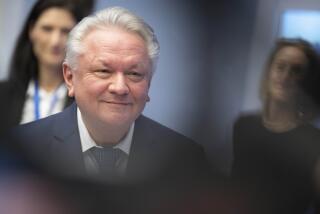Let the Great Rivals Join Against Terror
- Share via
Last week’s massacres at airport terminals in Rome and Vienna evidence a new phase in the use of terrorism to influence the policies and conduct of the more industrialized world. Terrorism has become institutionalized. Instead of random, almost whimsical, assaults, a coherent program for murder and kidnaping has been established.
The components of this institutionalized terror now reach from the Middle East to Moscow, Western Europe and the United States, auguring more frequent assaults for the coming year.
To counter this new threat will require a larger and more thoughtful response than the usually fruitless cries for revenge against the attackers. They are merely weapons--the obedient troops of political leaders who have succeeded in refining terrorism into a form of covert warfare. And they can only be halted not by individual vengeance but by striking against those who sustain them with training, money, weapons, command direction and artfully contrived transnational organization.
This new covert war has many sources, but principal among them--the essential support for all the rest--is the Libya of Moammar Kadafi. This is the hand that feeds and the mind that guides--a reality well known in the governing circles of the industrialized nations, including the Soviet Union, whose citizens are now in jeopardy, potential victims of this new form of warfare.
Still, the threatened nations do nothing to strike at the cause of terrorism rather than against its mindless instruments. This inaction has many explanations, but two among them have been decisive.
The first of these is money. Although the United States does not buy Libyan oil, American companies do--and in return for their profits help pay the cost of organizing and arming the instruments of terror. Other Western nations buy Libyan oil. And oil is just one entry in the ledger of profit. It is estimated that construction contracts and exports to Libya were worth $4 billion to suppliers from the European Community. And Libya has made investments in Europe. Surely Libya’s nearly 14% share in Fiat more than covered the cost of cleaning the bloodstained floors of a Roman airport lobby.
Since money is essential to Libyan support of terrorism, the conclusion seems obvious: Cut off the flow of money. Embargo the oil, end investment and halt trade. Unfortunately, it is not so simple. Even if Western nations and Japan were willing to forgo their Libyan profits, Kadafi has another business partner: the Soviet Union. Not only does the Soviet Union sell weapons to Libya, it could easily defeat an oil embargo by buying Libyan crude and selling its own on the world market.
But this obstacle is not decisive. At least it should not be. In the last year Soviet citizens have been kidnaped by terrorists, and they, like all other nationals, now risk deadly, random assault wherever they travel. Moreover, the Soviet Union, like the United States, has a real interest in containing the spread of covert terror that could escalate into open military actions by the nations of the Middle East--indeed, the desire for such an escalation is the motivation of those who back terrorists.
Still, despite the similarity of interest, there are few signs of potential cooperation between the United States and Moscow. This failure is not surprising. It is rooted in two decades of Middle Eastern history. When Sen. Edward M. Kennedy visited Moscow, Leonid I. Brezhnev told him that exclusion of the Soviet Union from Middle East peace efforts was a serious insult, that his nation was a great power with important interests in the area. Brezhnev spoke the truth.
Both superpowers--America and the Soviet Union--have been engaged in a fruitless, almost nonsensical, rivalry for influence. Whatever the initial causes of that rivalry, they have now become very hard to find. Our interest is oil and the independence of Middle Eastern nations. The Soviets don’t need the oil, and show no intention of adding the Middle East and North Africa to their post-war conquests. Indeed, any such move on their part would provoke a direct military confrontation with the United States.
Without American-Soviet cooperation in establishing peace, there will be no peace. Failure to work together will mean the continued intensification of the dangerous instability that both nations have cause to fear.
A joint effort to halt Libyan sustenance of covert warfare would be a logical and humane way to begin a process of joined involvement. Indeed, the spectacle of Soviet and American might united against terror might even overawe the insatiable greed of European and Japanese business. After all, they have their principles, too. And first among them, hard-learned in the caldron of the 20th Century, is: “Power is stronger than profit.”
More to Read
Sign up for Essential California
The most important California stories and recommendations in your inbox every morning.
You may occasionally receive promotional content from the Los Angeles Times.










